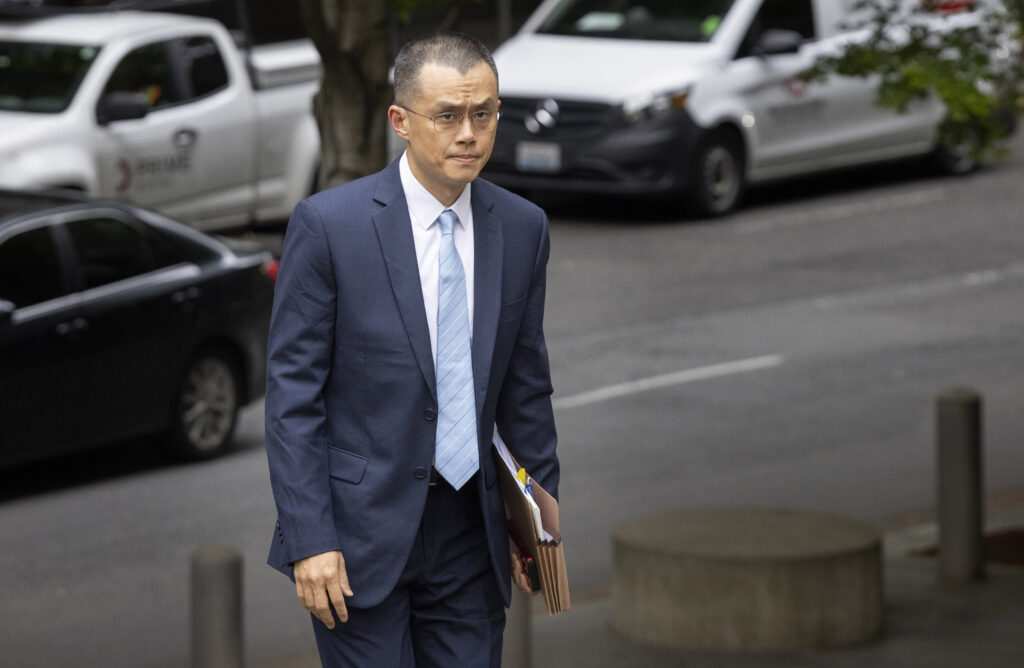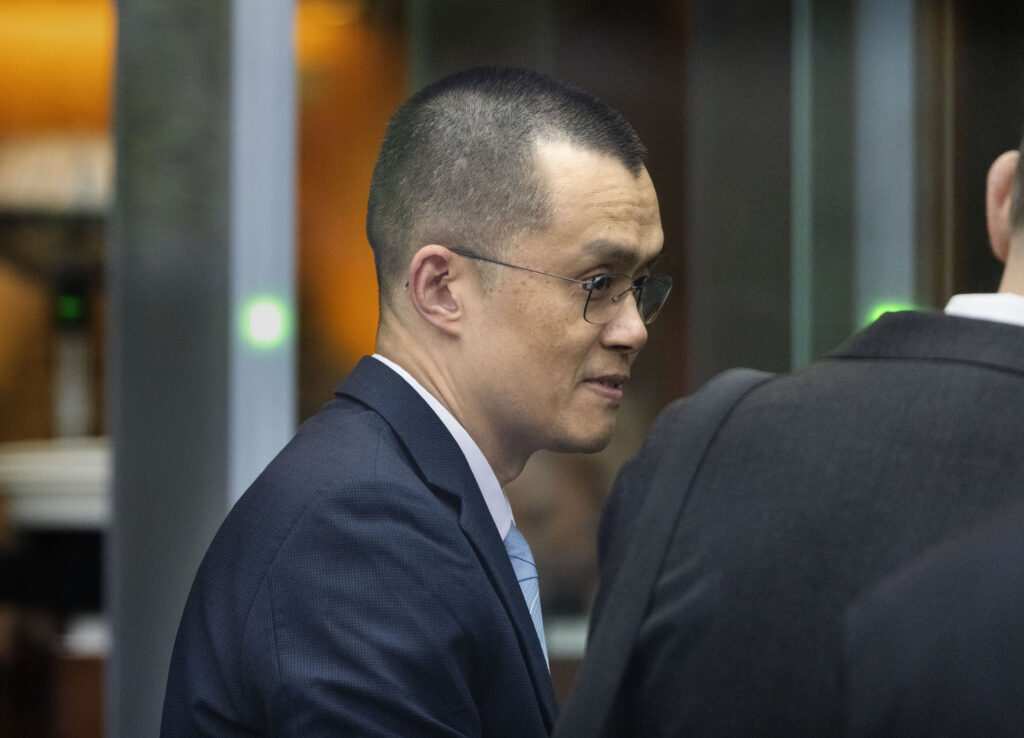Changpeng Zhao, the founder and former CEO of Binance, the world’s largest cryptocurrency trading platform, was sentenced in Seattle on Tuesday to four months in prison for failing to prevent money laundering on the exchange.
Both Zhao, who is known as CZ, and Binance pleaded guilty last year to failing to implement anti-money-laundering programs, with Binance agreeing to pay $4.3 billion in penalties.
Zhao pleaded guilty to one felony count and agreed to a $50 million fine.

U.S. District Judge Richard Jones delivered the sentence in a packed courtroom at the federal courthouse. Prosecutors had asked for three years in prison, while Zhao’s attorneys had requested probation. The U.S. probation office recommended a five-month sentence.
Jones, from the bench, said the specific violation of the federal Bank Secrecy Act was “unprecedented in terms of the volume, scale and massiveness,” and that Binance “essentially turned a blind eye” to potential terrorism financing and drug trafficking.
“You have to understand that despite wealth, power, or status, no person, regardless of wealth, is immune from prosecution or above the laws of the United States,” Jones told Zhao as he handed down the sentence. “You prioritized Binance’s growth and profits over compliance with United States laws and regulations.”
But he credited Zhao for taking responsibility for his actions, seeking to make amends, and for returning to face the charges from the United Arab Emirates, where he lives, a country without an extradition treaty with the United States.
“I failed here, I deeply regret my failure and I’m sorry,” Zhao said Tuesday, addressing the judge ahead of sentencing. Zhao, who appeared somber and focused throughout the two-hour hearing, spoke for about four minutes, reading from prepared remarks.

“Both of my parents worked really hard to give me opportunities,” he said. “For the next chapter of my life I want to provide opportunities to others.” He has said he is launching a free online learning platform with the goal of providing education to kids around the world.
Zhao’s mother, son and sister attended the hearing. U.S. Attorney Tessa Gorman, the chief federal prosecutor in Western Washington, watched from the back of the courtroom.
Zhao, who left the courthouse without commenting, will likely serve his time at the federal detention center in SeaTac.
Federal prosecutors said Binance — a central exchange for buying, selling and trading hundreds of different cryptocurrencies — failed to comply with the most basic requirements of financial institutions to prevent their services from being used for money laundering.
It declined to implement the type of basic protocols that banks and financial institutions use to prevent money laundering: Verifying customers’ identity, systematically monitoring transactions and reporting suspicious activity.

“This was a plan,” Kevin Mosley, a D.C.-based federal prosecutor, told the court Tuesday. “Breaking U.S. law was not incidental to his plan to make as much money as possible; violating the law was integral to that endeavor.”
One Binance compliance officer, according to prosecutors, said the company’s strategy was to tell criminals “come to binance we got cake for you.”
In arguing for a prison sentence, prosecutors noted that Zhao has become famous and spectacularly rich through his crime. Bloomberg estimates Zhao’s fortune at nearly $43 billion, and he still owns a major share in Binance, despite giving up control of the company.
Zhao’s attorneys argued he has fully accepted responsibility and that similar cases saw defendants face no jail time.
“There is not a single case in which a person convicted of this (Bank Secrecy Act) offense,” defense attorney William Burck said, “when there is no other crime alleged, who’s been sentenced to prison. Not a single one.”
Another defense attorney, Mark Bartlett, emphasized Zhao’s life story — he grew up poor in China, before immigrating to Canada, where he worked at a McDonald’s and as a volleyball coach before starting Binance.
“He got into crypto because he wants to change the world,” Bartlett said. “He wants a finance system that would support people in Kenya as well as New York.”
Binance, which pleaded guilty to three felony counts, also allowed its U.S. customers to illegally interact with countries under economic sanctions, including North Korea, Iran and Syria, according to prosecutors.
Binance, prosecutors said, failed to register with the Treasury Department’s Financial Crimes Enforcement Network, known as FinCEN, and to take steps to prevent money laundering on the platform. Instead, prosecutors said, Binance said it would block U.S. customers from its main exchange, even as it took steps to maintain high-value “VIP” customers.
Zhao “knew that U.S. users were essential for Binance to grow,” the plea deal says, but that if Binance were to take anti-money-laundering steps, “some customers would choose not to use Binance and others would be rejected by the compliance process — both of which would interfere with Binance gaining market share.”
Zhao stepped down as CEO of Binance last year, a week after pleading guilty.
Binance and Zhao had been under investigation since 2020, Justice Department attorneys said last fall.
The case was investigated and prosecuted in Seattle because Binance’s cloud servers are based in Western Washington, according to the charges. Some of the illegal transactions involving U.S. citizens doing business with banned countries occurred in the Seattle area as well.
Zhao played a prominent role in the downfall of his onetime rival, Sam Bankman-Fried, the former CEO of crypto platform FTX, who was sentenced to 25 years in prison this year.
In 2022, Zhao first said Binance would buy FTX, potentially rescuing the exchange as it struggled to cover customers’ accounts. But the next day he reversed course, saying FTX’s issues “are beyond our control or ability to help.”
FTX filed for bankruptcy two days later, and Bankman-Fried was indicted a month after that, accused of stealing $8 billion of FTX customers’ funds. Bankman-Fried was convicted in November and Zhao pleaded guilty three weeks later.
The case against Zhao was much different than the one against Bankman-Fried. Zhao was charged with, essentially, turning a blind eye to potential criminality on his platform, while Bankman-Fried was convicted of perpetrating a massive fraud on his customers.
“We are not suggesting that Mr. Zhao is Sam Bankman-Fried or that he is a monster,” Mosley said Tuesday. “We are not trying to kill the cryptocurrency industry.”
Still, the highest levels of the Justice Department linked the two cases in public, in arguing that it was focusing enforcement on what’s long been regarded as a lightly regulated cryptocurrency industry.
“In just the past month, the Justice Department has successfully prosecuted the CEOs of two of the world’s largest cryptocurrency exchanges in two separate criminal cases,” U.S. Attorney General Merrick Garland said last year, after Bankman-Fried’s conviction and Zhao’s guilty plea. “The message here should be clear: using new technology to break the law does not make you a disruptor, it makes you a criminal.”
U.S. Treasury Secretary Janet Yellen said last fall that Binance’s “willful failures allowed money to flow to terrorists, cybercriminals, and child abusers through its platform.”
___
© 2024 The Seattle Times
Distributed by Tribune Content Agency, LLC.



